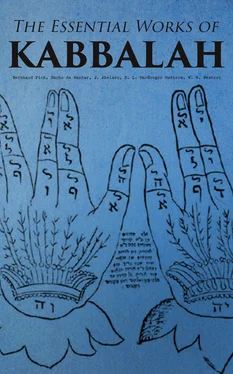I will only remark that by the system called Athbash, it is found that the word Sheshhach in Jer. xxv. 26 is the same as Babel, and that Jerome is said to have confidently applied this system. 22
Besides these canons the Cabala also sees a recondite sense in the form of the letters, as well as in the ornaments which adorn them. The more multifarious these trifles, the easier it is to arrive in every given case at a result, and the less wit or thought is required.
Although the canons mentioned above are already applied in the Talmud and Midrash, the Cabalists made a more copious use of them. The names of God became a special object of their fancy. With them they imagined they could accomplish everything and perform miracles, heal the sick, extinguish the fire, etc. The most miraculous effects were ascribed to the Tetragrammaton. Whoever was in possession of the true pronunciation of that name could enter in relation with the upper world and receive revelations. Each letter of the sacred name was considered as something mysterious. The letter Y (of YHVH) referred to the father as creator (abba) and H to the mother (imma). Because the letter H occurred twice, they distinguished an upper and a lower mother. The permutation of the letters of the Tetragrammaton brought about a multitude of new divine names which, either spoken or written, influenced the course and laws of nature. As was the case with the name of God consisting of four letters, so it was with that consisting of twelve, twenty-two, forty-two and seventy-two letters. All were believed to contain great mysteries. 23The names of angels were treated in like manner. Thus the Cabalists greatly misused the Old Testament, especially the Thora. And, as says Professor Wiinsche, by making the Bible a text-book to elicit deeper ideas, the greatest nonsense and rubbish came to light. The so-called hidden mysteries and revelations were nothing but fancies whirling in the heads of the Cabalists. The exegetical literature of the Cabala clearly proves that its representatives had completely lost the sense for a suitable understanding of the words of scripture. 24
1Rabbi Azariel in his commentary on the ten Sephiroth tells us that "the En Soph can neither be comprehended by the intellect, nor described in words; for there is no letter or word which can grasp him." With this compare what Proclus, the neo-Platonist, says in his Theology of Plato, II, 6: "Although the Divinity is generally called the unity (to eV) or the first, it would be better if no name were given him; for there is no word which can depict his nature—he is the inexpressible, the unknown. Isaac ibn Latif (1220-1290) even says "God is in all, and everything is in God."
2This must not be confounded with "the Aged of the Aged" as the En Soph is called.
3When the Concealed of the Concealed wished to reveal himself, he first made a single point; the Infinite was entirely unknown, and diffused no light before this luminous point violently broke through into vision." (Zohar, I, 15a.)
4So called by Rabbi Azariel.
5He flourished in the first half of the twelfth century and is the author of a treatise on the Emanations (Massecheth Aziluth) reprinted by Jellinek in his Auswahl Kabbalistischer Mystik, Part I. Leipsic, 1853.
6Graetz, Gnosticismus und Judentum, 1846, p. 44, derives the word from Atera Opovov, because this angel is immediately under the divine throne. Cassel (Ersch and Gruber's Encyklop'ddie, section II, vol. XXVII, s. v. "Juden," p .40, note 84) derives it from metator, i. e., "messenger, outrider, pathfinder." Wunsche also connects it with ticT&rwp. According to the Zohar, I, 126&, Metatron is the first creature of God; the middle pillar (in the essence of God) or the uniting link in the midst, comprising all grades, from top downwards, and from the bottom upwards (ibid.. Ill, 127a) ; the visibly manifested Deity (ibid., Ill, 231a).
7Zohar, III, 48a.
8Zohar, II, 70b.
9Compare Book of Wisdom, VIII, 20; Josephus, Bell. Jud., II, 12, speaks of the Essenes as believing in a pre-existence of the soul. Philo's views are given in his De somniis, I, 642; De gigaiitibus, I, 263 f.
10According to Josephus (Antiq., XVIII, 13; Bell. Jud., II, 8, 14) it would seem as if the Pharisees held the doctrine of the metempsychosis, but see Schurer, Geschichte des judischen Volkes, vol. II (3d ed., 1898) p. 391; on Philo's view, see ibid., vol. Ill, p. 561.
11For a strange interpretation of scripture in modern times, the reader is referred to Canon Wordsworth's Commentary on Genesis and Exodus, London, 1864, p. 52.
12On the interpretation of the scriptures among the Jews in general, see my article s. v. "Scripture, Interpretation of, Jewish," in McClintock and Strong.
13The word is not like yeufxerpia, as Levy, Neuhebr. tVorterbuch, I, 324, thinks, but is derived from γραμματεία or γράμμα.
14For a somewhat different mode compare The Open Court, Feb. 1909, p. 88.
15בראשית
16פסים
17פ = Potiphar, ס = Sochrim (merchants), י = Ishmaelites, ם = Midianites.
18Ἰησοῦς Χριστός, Θεοῦ Υἱός, Σωτὴρ.
19ἰχθύς.
20English translation by M. Dodd, City of God, Edinburgh, 1871, where the Greek letters at the beginning of ; the lines are retained.
21σταυρός.
22Hottinger possessed an entire Pentateuch explained on the principle of Athbash.
23Compare what we stated above in connection with Abulafia.
24A somewhat different view on the cabalistic treatment of scripture is given by the late Jewish scholar Zunz (died 1886) in his Gottesdienstliche Vortrdge (Berlin, 1832), p. 403: For the passage in English see my article "Scripture Interpretation" in McClintock and Strong, vol. IX, p. 480.
CHAPTER VI.
THE CABALA IN RELATION TO JUDAISM AND CHRISTIANITY.
Table of Contents
Judaism.—It must be acknowledged that the Cabala intended to oppose philosophy and to intensify religion. But by introducing heathenish ideas it grafted on Judaism a conception of the world which was foreign to it and produced the most pernicious results. In place of the monotheistic biblical idea of God, according to which God is the creator, preserver and ruler of the world, the confused, pantheistically colored heathenish doctrine of emanation was substituted. The belief in the unity of God was replaced by the decade of the ten Sephiroth which were considered as divine substances. By no longer addressing prayers directly to god, but to the Sephiroth, a real Sephiroth-cult originated. The legal discussions of the Talmud were of no account; the Cabalists despised the Talmud, yea, they considered it as a canker of Judaism, which must be cut out if Judaism were to recover. According to the Zohar, I, 27b; III, 275a; 279fr, the Talmud is only a bondmaid, but the Cabala a controlling mistress.
The Cabalists compared the Talmud to a hard; unfruitful rock, which when smitten yields only scanty drops that in the end become a cause of controversy; whereas the study of the Cabala is like a fresh gushing spring, which one needs only to address to cause it to pour out its refreshing contents. 1
And as the Cabalists treated the Talmud, they likewise treated philosophy, which defined religious ideas and vindicated religious precepts before the forum of reason. Most Cabalists opposed philosophy. She was the Hagar that must be driven from the house of Abraham, whereas the Cabala was the Sarah, the real mistress. At the time of the Messiah the mistress will rule over the bondmaid.
But the study of the Bible was also neglected, Scripture was no longer studied for its own sake, but for the sake of finding the so-called higher sense by means of mystical hermeneutical rules.
Even the rituals were variously changed and recast. The putting on of the phylacteries and prayer-mantle (talith) was accompanied by the recitation of cabalistic formulas and sentences; special prayers were also addressed to the Sephiroth. Connected with all this was an extravagant, intoxicating superstition. To enable the soul to connect itself with the realm of light and its spirits, or to be transplanted after death into its heavenly abode, one underwent all manner of austere ascetical exercises. With the mysterious name of God they believed themselves enabled to heal the sick, to deliver demoniacs and to extinguish conflagrations. By application of the right formulas of prayer, man was to have power and influence on both the kingdoms of light and darkness. When the Cabalist prays, God shakes his head, changes at once his decrees, and abolishes heavy judgments. The magical names of God can even deliver the condemned and free them from their torments in their place of punishment. In this respect we even meet with the doctrine of the Catholic mass for the souls. 2The Book of Psalms with its songs and prayers was especially considered as a means of producing all manner of miracles and magic, as may be seen from the Sepher Shimmush Thehillim (literally, "the Book of the Cabalistic Application of the Psalms"), a fragment of the practical Cabala, translated by Gottfried Selig, Berlin, 1788.
Читать дальше












